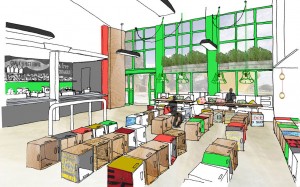We are delighted to announce that The Carnegie Trust is sponsoring Common Futures to contribute to an exciting project, led by The Creative Coop and Colchester School of Art, which involves establishing a library/hack/maker space in St Botolphs, Colchester.
 The project started life as a regeneration initiative located at the heart of Colchester’s ‘cultural quarter’ in St Botolphs. It is underpinned by a meanwhile lease attached to the Old (bus station) Waiting Room and is being spear-headed by 100+ creative industries proponents who are eager for community-led change in their locale.
The project started life as a regeneration initiative located at the heart of Colchester’s ‘cultural quarter’ in St Botolphs. It is underpinned by a meanwhile lease attached to the Old (bus station) Waiting Room and is being spear-headed by 100+ creative industries proponents who are eager for community-led change in their locale.
Common Futures will draw upon activities underway right around the world at present to co-locate public libraries with hacker and maker spaces – see, for example, 4th Floor Chatt in the USA – to contribute to the design of a contemporary community publishing platform there over the coming months. In particular, we’re eager that this prototype space should inform efforts elsewhere to establish more enterprising libraries. So, we will be working in partnership with Essex Libraries, and we are already talking to other library authorities in England about how we might support replication initiatives.
Further details will be made available via the main project website in due course: http://www.st-botolphs.org/ and interested parties should follow @stbotolphs_ for regular updates. But, for now, check out details of the Grand Opening!


